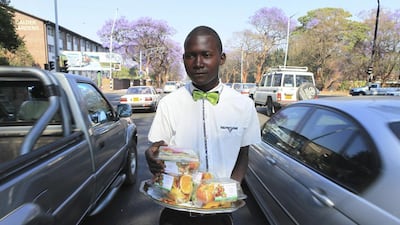HARARE, ZIMBABWE // In his three-piece suit, matching hat and bow tie, Farai Mushayademo could easily pass for a celebrity musician – if only his job didn’t involve dodging cars at a busy intersection in Zimbabwe’s capital, Harare, selling bottled water and potato chips to passing motorists.
Mushayademo’s distinctive dress sense, with a different shiny suit every day, makes him a darling of customers and helps him beat the “rising competition”, he said.
Massive joblessness in this once-prosperous southern African country has forced many to flood the streets, where they hawk anything from medicines to car parts. A good gimmick can help a vendor stand out from the crowd.
While such scenes are common throughout Africa, they are unusual in Zimbabwe, where vendors once were found only at legally designated stalls. Now, as the economy plunges, such order is breaking down.
Sidewalks in Harare and other cities and towns are hardly passable for pedestrians due to the high volume of vendors. Some plunge into the streets to target motorists.
“The suits are part of my marketing strategy,” Mushayademo said.
“Vendors are associated with shabbiness, but people want to buy food from someone who is smartly dressed,” said the 35-year-old father of three, a tailor by profession.
Tailors have been hit hard because of an influx of secondhand clothes smuggled from neighbouring Mozambique that sell for as little as US$1 (Dh3.67).
Zimbabwe’s official unemployment rate is 11 per cent, according to the country’s statistics agency, Zimstat, but the figure excludes informal traders such as street hawkers who are officially defined as employed because they earn an income.
That sector is booming, with over 90 per cent of the people officially defined as employed involved in informal trade, according to Zimstat figures.
President Robert Mugabe, the country’s longtime leader, had promised to create 2.2 million jobs in five years during his 2013 election campaign – but that has not happened.
With the growing population of street vendors, some have no choice but to get creative to get ahead.
Tired of shouting to market their wares, some have recorded sales pitches that they blast repeatedly over speakers, creating a chaotic buzz throughout Harare’s downtown area.
Others turn to performing.
“My antics are meant to cultivate a personal relationship with customers,” said Gilbert Mundicha, who sells mobile phone airtime vouchers on a street in a wealthy, multi-racial suburb. He dances, makes military salutes and greets nearly every passing motorist while mimicking what he described as a “British accent”.
Motorists love him for it, and he appears to have built a loyal customer base.
Some stop their cars to buy specifically from him. Others roll down their windows to greet him by name.
“Business is good,” Mundicha said.
The brashness of some street vendors has drawn the attention of established businesses, which are moving in to maximise their own marketing.
Mundicha, who was wearing a T-shirt branded with the logo of a popular radio station, said marketing people often gave him their branded T-shirts to wear.
Mushayademo, whose trademark is his three-piece suits, last month appeared in an issue of a leading clothing chain’s in-store magazine.
“I am looking for an agent. I can be a successful fashion model,” he said.
His eyes darted around for signs of both customers and the police, who have been having running battles with street vendors in a bid to clean up what was once one of Africa’s cleanest cities.
* Associated Press

